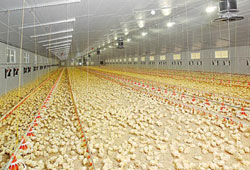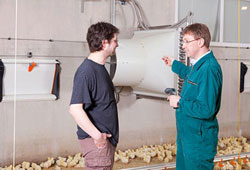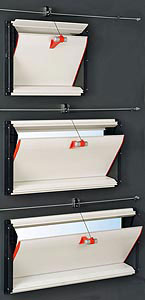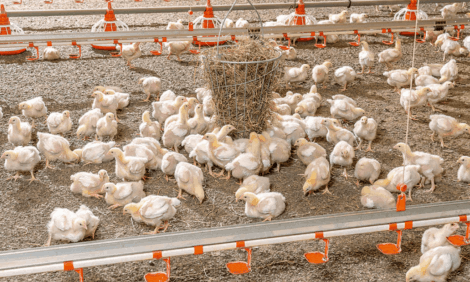



Innovative Concept Also Saves Money
Two years ago, one's of Big Dutchman's customers planned and built his two poultry sheds in such a way that he could start work with a good feeling every morning.Markus Röwer does not do things by halves. “Sustainable thinking in connection with housing and equipment for livestock is something which pays handsome dividends," says the third-generation farmer. This is why, two years ago, he planned and built his two poultry sheds in such a way that he can always start work with a good feeling in the morning. It is important for him that his animals feel at home in the new building and that they have optimum conditions for healthy growth.


In addition to feed and water, it is particularly important to be able to guarantee optimum temperatures in the poultry houses.
“The ground temperature (32°C) is of prime importance as the chicks cannot produce any warmth for themselves during the first days”, explains Mr Röwer.
This is why, particularly in the winter, we have the heating system running at full power.
Heating Concept Already Proved its Worth in Pig Production
Against the background of constantly increasing gas prices, Mr Röwer decided to look for alternative ways of heating his livestock buildings and indeed he soon found a solution: a heating system which functions with hot water. From his own experience with wood chip heating, which was installed some years ago at his parents’ farm and has been providing heat for the sow house and the pig fattening house ever since, he decided to adopt this system.
He explained: “Because this system means you can be very flexible as far as fuel is concerned.” Pellets, wood shavings, sunflower seed shells etc. can be used as fuel. Now he operates the new heating system together with a neighbour who also rears broilers so a total of six buildings are supplied with hot water.
Energy-Saving Poultry Sheds
As it was no longer possible to extend the existing premises, the two new poultry houses – 21.50 metres wide × 100 metres long – were built at a new location. Mr Röwer placed great emphasis here on an energy-saving form of construction. Particularly worthy of mention here are the insulated floor slabs, concrete walls and the insulation of the ceiling with 8-cm thick Selthaan panels with overlap. Floor heating was installed as the heating system in all the poultry houses.
This has a number of advantages in poultry growing, according to Mr Röwer.
He said: “When they move in to the new housing, the chicks are very sensitive; they first have to adjust to the new surroundings and look for feed and water. This is why it is so important for the floor to be warm. It also means there will not be any problem with damp litter later on and the balls of the feet remain healthy."
Housing Equipment for Ideal Temperatures

The three-way heating regulation in connection with the Viper climate computer ensures that the floor temperature is always kept at the required level. In addition, a convector heating system was installed in order to cover any short-term heat requirements – floor heating systems react rather sluggishly – or also to extract excess air moisture from the poultry shed.
Here, a decision was made in favour of HeatMaster 4 H by the housing systems supplier, Big Dutchman. Only two appliances are required per poultry house as the ventilator that has been installed has a big enough working range to ensure a good distribution of warm air throughout the shed.
Balanced House Environment Due to Combi-Ventilation
In the design of the fresh air duct, the farmer decided in favour of a combi-ventilation system. This involves using two fresh air systems, consisting of wall inlets and fresh air chimneys. In the moving-in process and during the first days of breeding, broiler chicks require a lot of heat and very little movement of air. With wall ventilation only, it is difficult in this phase to produce air circulation throughout the poultry shed and at the same time keep the heating costs low.
For this reason, Mr Röwer decided to use fresh air chimneys.
“Big Dutchman has already had good experience with this kind of fresh air duct," explains product manager, Jörg Bohnes.
The decisive advantage is that the Fumus fresh air chimney can also work with balanced pressure in the case of minimum ventilation as it is fitted with a ventilator in the lower section. Thus the fresh air which it absorbs – which actually comes from the ceiling area and is therefore already fairly warm – is released by the fresh air distributor into the poultry house. Depending on the position of the throttle valve, up to 100 per cent fresh air or up to 100 per cent circulating air gets into the bird area. Constant air circulation is produced in the poultry house and the warm circulating or mixed air ensures a very good circulation of heat.
Save Heating Costs with Housing Systems by Big Dutchman
“In the winter months," according to Mr Röwer, “the wall ventilation is not used at all. The entire ventilation runs via the fresh air chimneys.“ In addition the DOL 17 sensor measures the carbon dioxide level in the house air so that the climate computer can adjust appropriately to the minimum ventilation.
“This saves heating costs in broiler production," says Mr Röwer with some delight on viewing the evaluations of the last 12 grow-outs.
From an air flow rate of 20 per cent, the climate computer switches over to the fresh air duct via the longitudinal house sides. Then, 100 per cent of the fresh air comes from the CL 3000 Flex- wall inlets, which are of relatively large dimensions and therefore produce a very stable air stream. A further advantage is that only very little negative pressure is required to work, which naturally also saves energy. When the inlets are completely open, the fresh air is channelled directly onto the floor. Thus, the birds in the poultry house receive an immediate supply of fresh air and the sultry-warm layer of air is disposed of via the floor of the housing.
Refreshing Housing System Technology
On hot days in the summer months, Mr Röwer also switches on his FoggingCooler spray cooling system. In the area of poultry growing, it is already a standard feature of housing systems as it is not only used for cooling but also in situations when it is necessary to increase the relative level of air moisture.
In order to fulfil the official regulations imposed by the authorities, Mr Röwer has furthermore decided in favour of a central exhaust air duct with a tower 12.4 metres above ground.
Overview of results from Mr Röwer's poultry house
Number of growing places: 89,000
Number of growing days: 35/42
Selling weight: 1820g/2600 g LG
Number of animals sold: approx. 670,000 animals/year
Mortality: 2.2 per cent
Grow-outs per year: 7.7
Energy consumption: 553,000 kWh/year; 0.8 kWh per animal moved in (annual average)












